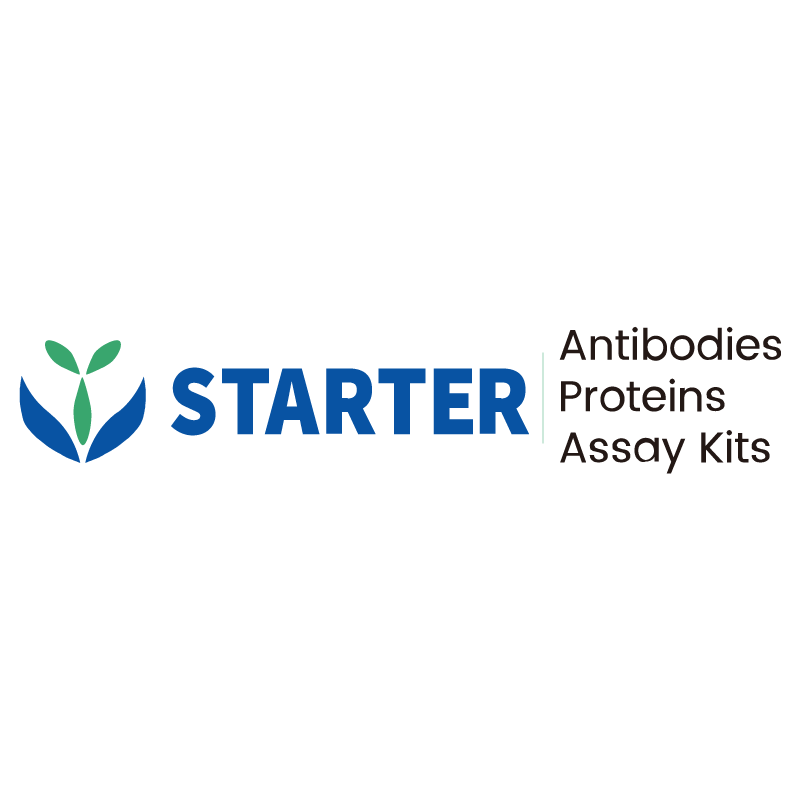WB result of DLL3 Recombinant Rabbit mAb
Primary antibody: DLL3 Recombinant Rabbit mAb at 1/1000 dilution
Lane 1: HeLa whole cell lysate 20 µg
Lane 2: TT whole cell lysate 20 µg
Negative control: HeLa whole cell lysate
Secondary antibody: Goat Anti-rabbit IgG, (H+L), HRP conjugated at 1/10000 dilution
Predicted MW: 65 kDa
Observed MW: 60 kDa
Product Details
Product Details
Product Specification
| Host | Rabbit |
| Antigen | DLL3 |
| Synonyms | Delta-like protein 3, Drosophila Delta homolog 3 (Delta3) |
| Immunogen | Synthetic Peptide |
| Location | Cytoplasm |
| Accession | Q9NYJ7 |
| Clone Number | S-207-179 |
| Antibody Type | Recombinant mAb |
| Isotype | IgG |
| Application | WB, IHC-P |
| Reactivity | Hu |
| Predicted Reactivity | Bv |
| Purification | Protein A |
| Concentration | 0.5 mg/ml |
| Conjugation | Unconjugated |
| Physical Appearance | Liquid |
| Storage Buffer | PBS, 40% Glycerol, 0.05% BSA, 0.03% Proclin 300 |
| Stability & Storage | 12 months from date of receipt / reconstitution, -20 °C as supplied |
Dilution
| application | dilution | species |
| WB | 1:1000 | |
| IHC-P | 1:500 |
Background
DLL3, or Delta-like ligand 3, is a protein that is overexpressed in a significant proportion of small cell lung cancer (SCLC) tumors. It is a type of ligand that interacts with the Notch signaling pathway, which is involved in cell differentiation and proliferation. DLL3 is considered an attractive target for cancer therapies because of its limited expression in normal tissues, which may reduce the risk of on-target, off-tumor toxicity. Therapeutic strategies targeting DLL3 include antibody-drug conjugates (ADCs), bispecific T-cell engagers (BiTEs), and chimeric antigen receptor (CAR) T-cell therapies. These approaches aim to direct immune cells to DLL3-expressing cancer cells, leading to their destruction. Notably, DLL3-targeted therapies are in various stages of clinical development, with some showing promise in early-phase trials for the treatment of SCLC, which has limited treatment options and a generally poor prognosis. The development of DLL3-targeted therapies represents a significant effort to improve outcomes for patients with this aggressive form of lung cancer.
Picture
Picture
Western Blot
Immunohistochemistry
IHC shows positive staining in paraffin-embedded human medullary thyroid carcinoma. Anti-DLL3 antibody was used at 1/500 dilution, followed by a HRP Polymer for Mouse & Rabbit IgG (ready to use). Counterstained with hematoxylin. Heat mediated antigen retrieval with Tris/EDTA buffer pH9.0 was performed before commencing with IHC staining protocol.
Negative control: IHC shows negative staining in paraffin-embedded human papillary thyroid carcinoma. Anti-DLL3 antibody was used at 1/500 dilution, followed by a HRP Polymer for Mouse & Rabbit IgG (ready to use). Counterstained with hematoxylin. Heat mediated antigen retrieval with Tris/EDTA buffer pH9.0 was performed before commencing with IHC staining protocol.
Negative control: IHC shows negative staining in paraffin-embedded human cervical squamous cell carcinoma. Anti-DLL3 antibody was used at 1/500 dilution, followed by a HRP Polymer for Mouse & Rabbit IgG (ready to use). Counterstained with hematoxylin. Heat mediated antigen retrieval with Tris/EDTA buffer pH9.0 was performed before commencing with IHC staining protocol.
Negative control: IHC shows negative staining in paraffin-embedded human colon. Anti-DLL3 antibody was used at 1/500 dilution, followed by a HRP Polymer for Mouse & Rabbit IgG (ready to use). Counterstained with hematoxylin. Heat mediated antigen retrieval with Tris/EDTA buffer pH9.0 was performed before commencing with IHC staining protocol.
Negative control: IHC shows negative staining in paraffin-embedded human kidney. Anti-DLL3 antibody was used at 1/500 dilution, followed by a HRP Polymer for Mouse & Rabbit IgG (ready to use). Counterstained with hematoxylin. Heat mediated antigen retrieval with Tris/EDTA buffer pH9.0 was performed before commencing with IHC staining protocol.


